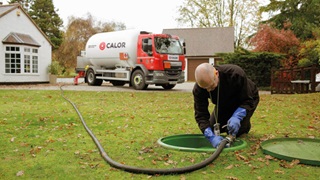From The Experts at Calor: How to Manage Your Gas

However, living in an off-grid home powered by rural energy such as LPG or BioLPG isn’t all that different from properties on the mains-gas grid, yet there’s still some things which are important to consider.
We’ve spoken to our customer service experts at Calor, to shed a light on some of the most common customer queries on LPG heating:
This can depend on whether you have auto-ordering set up. If you do have auto-ordering, this isn’t something you need to worry about, as Calor will monitor your LPG levels for you, and schedule a delivery when your tank levels are looking low.
If you use the self-ordering system, then you can see how much gas is left in your tank by checking the gauge, which is usually located on the hood of the tank and displayed in percentages or fractions. We would recommend ordering a gas top-up when the gauge is showing that the tank is below ¼ or 25% full.
For those currently self-ordering our gas, you can look into switching to auto-ordering through our website by clicking here.
Depending on the location of your gas tank, building an extension can potentially impact its functions. That’s why, if this is something you’re considering, we always recommend contacting Calor in the first instance on 0800 626 626, as we will be able to help you understand your tank requirements.
There are also several things to consider to keep your tank both operational and safe during any renovation work. Firstly, keep weeds, rubbish and any flammable materials at least three meters away from the tank. The same applies to any structures such as hedges, garages, walls, and rockeries, as well as any vehicles.
In addition, if your tank is underground please don’t remove the green marker pegs around the tank, as this ensures that a Calor member of staff can easily access and check the tank if needs be. We also don’t recommend painting the tank or any equipment associated with it, as this can lead to potential damage.
While gas leaks are very rare, they are still something we take extremely seriously. If you suspect a leak, call our emergency service line on 0345 744 4999 and we’ll be able to guide you through an initial investigation of the leak. However, here are a few precautions we would recommend you take:
If you live on an estate with gas supplied via a central storage tank, then this is quite similar to mains gas. The central tank which powers the estate will be connected to your home via underground pipes, and it enters your home through a meter. These central tanks are fitted with a telemetry unit, which automatically monitors the fuel levels within the tank and these readings get sent directly to us so that we know when to organise the next delivery. This means you don’t need to worry about running out of gas.
However, you are responsible for the outlet of the meter, the pipework, and appliances on your property. So, if you are having any issues with these, we’d advise getting in touch with Calor as we can arrange for these to be checked.